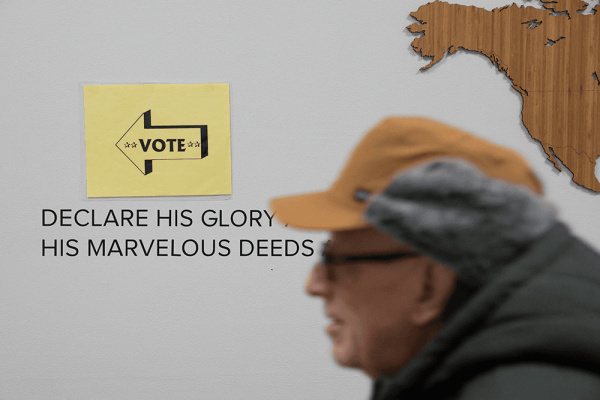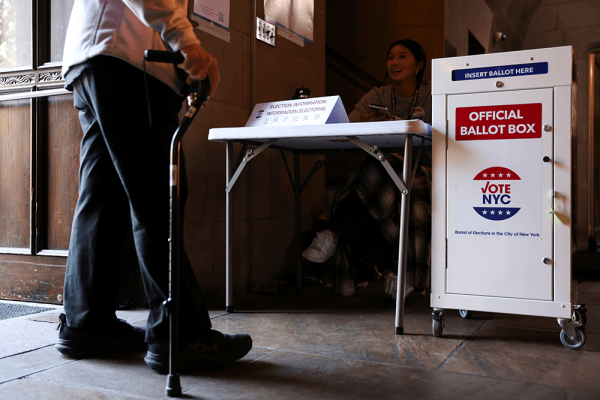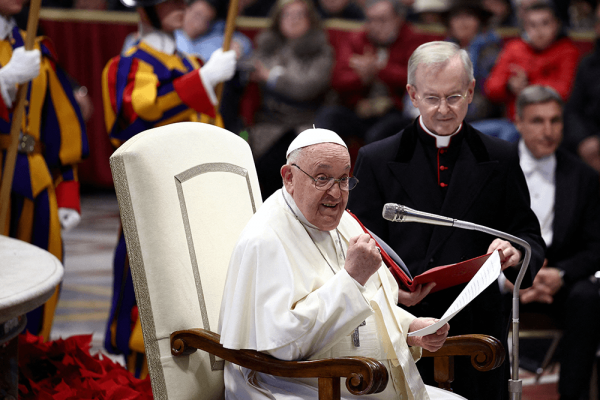Digging through the basement of the Bishop Payne Library last year, I came across a book titled Black Christian Nationalism.
I laughed, snapped a photo to send it to my friend and co-editor Josiah, and kept on looking for the book I had meant to find. Josiah and I joked about how the book might confound liberal Christians who are overly focused on rooting out “white Christian nationalism” without clearly defining what that phrase actually means, considering whether it's a problem in their own congregations, or listening to good-faith criticisms of their efforts. But I couldn’t stop thinking about the book. Written by Albert B. Cleage, Jr., a pastor from Detroit, it is a provocative proposal that drew from separatist politics and liberation theology in the quest for the freedom of Black people.
As countless Christians have expressed their disappointment with the results of the presidential election, many have heard in response platitudes such as “God is still on the throne” or “God is not Republican or Democrat.” Zach Lambert has heard those messages before. But as lead pastor of Restore Austin, he and his Texas team took a different approach. Instead of trying to “turn eyes heavenward,” his team worked to remind their church that God was with them in their grief and struggle.
Since his death, Carter’s remarkable life and numerous accomplishments have been rightly celebrated, including the Camp David Accords, a historic nuclear weapons treaty, major environmental protection legislation, the release of political prisoners, the near-eradication of the Guinea worm, aid in conducting free and fair elections in dozens of countries around the world, and decades of volunteer service with Habitat for Humanity. But despite this impressive legacy, what most inspires me about Carter was how he applied his faith to the messiness of politics, both during his time in the White House and in his many years after — a model that we desperately need today in our increasingly polarized and vitriolic politics.
Awareness months, weeks, and days are the kind of thing that often feel manufactured to get us to buy things: It’s Black History Month in February, so buy anti-racist books or something; it’s Stress Awareness Month in April, so invest in yourself and sign up for a mindfulness meditation class; May 6-12 is National Nurses Week, so buy some stuff and send it to a local hospital. These are all fine things to do, but is that all there is to this? Are awareness months just an excuse to throw some money at a cause? Is it just a convenient hook for journalists to write an article about a certain cause or group of people?
During the 2024 August primary election, a Detroit man called the Election Protection Hotline to report an accessibility issue at a polling location. The man, who had a mobility disability, went to vote at a church in the city where he was met with a flight of stairs but no ramp. He was forced to get out of his wheelchair and climb the stairs on his hands and knees before he could cast his vote.
When I visited Rev. Munther Isaac in Bethlehem, the West Bank, in October, he mentioned that he was previously opposed to liberation theologian James H. Cone. Isaac was trained in theologically conservative teachings, growing up in a conservative church and then leaving Palestine to attend a conservative seminary in the U.S.
“Jimmy Carter’s importance to faith and public life was reintroducing into the public square the principles that animated nineteenth-century evangelicals: concern for the poor, racial equality, peacemaking, human rights and equality for women,” Randall Balmer, professor of religion at Dartmouth told Sojourners. “He did so as an avowed and unapologetic Baptist, which means that he respected the First Amendment and the separation of church and state.”
An Israeli government minister criticized Pope Francis on Friday for suggesting the international community should study whether Israel’s military offensive in Gaza constitutes a genocide of the Palestinian people.
Prophets, by nature of their calling, are not well-liked. They must tell a community or nation what they’re doing wrong. In biblical times, modern times, and Ozian times, people don’t like to be told that they need to change their ways. So when Elphaba is called to disrupt the oppression that many have become complacent with, she is rejected for it.
I want to draw a careful distinction between saying that God can use an earthly event like an election to accomplish God’s purposes in the world and the claim that God — not the majority of American citizens who voted in the election this past November — chose Trump to become president.









